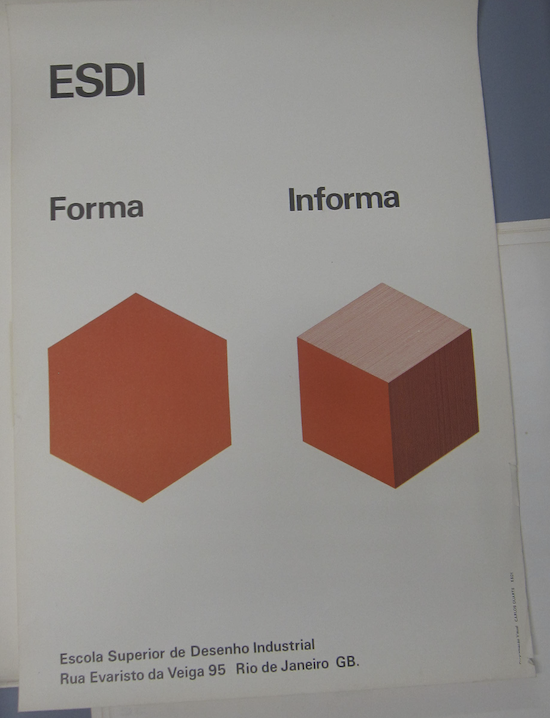Modern Design & Development
in Latin America
Design activities and designed artifacts have been at the core of developmentalist efforts to modernize Latin America and Brazil, in particular. You just need to think of Brasilia—Brazil’s modernist capital built in the desert over three years thanks to a colossal amount of manual labour and human cost—to associate nation building, infrastructural improvement and economic development with the design and architectural professions. This linkage, however, is still underexplored in design history.
My current research project examines modern design as a particular pedagogy in design training, as a professionalized activity, and as graphic and industrial design forms used to communicate progress, which became dominant in Brazil between the 1960s and 1970s. I study modern design formation through the installation of specialist design schools, professional bodies, national industrialization and modernization policies and transnational exchange with design and cultural institutions in Argentina, Chile, Germany, United Kingdom, Italy, and United States.
A recent project and publication, for example, explored the first International Industrial Design Biennial held in Latin America in 1968. Then, Brazilian design students mounted a protest exhibition at the Museum of Modern Art in Rio, where the Biennial occurred, to expose authoritarianism, curriculum inadequacies and cultural dependency in design. Besides being interested in the linkages between nation building efforts and modern design, I am particularly attracted by the fact that national development and design development happened in tandem in Latin American under the aegis of brutal military dictatorships. Why and how is modern design associated to the rise of of authoritarian cultures, is one of the key questions I have been pursuing.
Related Research Activities
‘Reframing Modern Design as Displacement: A Discussion through Decolonial Thinking on the Brazilian Experience’, in Lichtman S; Traganou T (eds.), Design and Displacement, Routledge, London (forthcoming).
2023
'Shared and not Contested: Modern Erasures in Design and Architecture: History, Practice and Education in Brazil', in Ashby C; Crinson M (eds.), Building/Object. Shared and Contested Territories of Design and Architecture, Bloomsbury, London, pp. 253-272. In collaboration with Tatiana Letier Pinto.
‘The Empty and the Full: Design Education, Modern Design Pedagogies and Student Protests in 1968 Brazil’ in Schools of Departure: a Digital Atlas of Bauhaus Pedagogy Post-1933, Bauhaus Dessau Foundation, Dessau. In collaboration with Clara Meliande
‘Designing Histories, New Futures’ at ParlourLab, an online series organised by Parlour: Gender, Equity, Architecture)
2022
Recipient of the UNSW Arts, Design & Architecture Faculty Research Fellowship (2021–2022) for consolidating and disseminating new knowledge on the correlation between design practice, social justice, and democracy in postcolonial contexts like Brazil’s.
‘“Deep Encounters” with the Archives: Reflections of a Design Historian in Brazil (in Two Acts)', RMIT Design Archives Journal, Special Issue: Archives, Harriet Edquist and Sarah Teasley (eds.), vol. 11, pp.8-19. Open Access: https://issuu.com/rmitdesignarchives/docs/rda_journal_25_11.2_supply_singlepages_issuu
This publication was based on my unpublished piece “Deep Encounters with the Design History Archive: From Brazil '68 to now” winner of the Design Writing Prize, Design History Society, 2020.
As the Design Writing Prize winner, ‘Megha Rajguru in Conversation with Livia Lazzaro Rezende, the 2020 Design Writing Prize Winner’, an interview for the Design History Society Podcasts, Australia & UK, 2020.
2021
2019
'Locating Design Exchanges in Latin America and the Caribbean', Journal of Design History, vol. 32, pp. 1-16 http://dx.doi.org/10.1093/jdh/epy048. Guest-edited Special Issue in collaboration with Patricia Lara-Betancourt.
This publication resulted from an international collaborative project with scholars from the US, UK, Chile, Argentina, Uruguay, Mexico, Brazil and Colombia to further scholarship on Latin American design history from a global and decolonial perspective.
Winner of the UNSW Art & Design 2019 Dean’s Award for Research Excellence.
Invited keynote speaker, with Lara-Betancourt, to present ‘Locating Design Exchanges in Latin America and the Caribbean’ at the Latino Design Histories Series, organised by AIGA Baltimore and the Society of Design Arts, United States, 2021.
The Bloomsbury Encyclopedia of Design, Edwards C (ed.), Bloomsbury Academic, London.
Seven commissioned entries on Design History & Education in Latin America:
'Asociación Colombiana de Diseñadores (ACD) (Association of Colombian Designers) (1976–)'pp. 94-95, http://dx.doi.org/10.5040/9781472596178-BED-A104
'Asociación Latinoamericana de Diseño (Aladi) (Latin American Association of Design) (1980–)', pp. 312, http://dx.doi.org/10.5040/9781472596161-BED-L018
'Escola Superior de Desenho Industrial (ESDI) (College of Higher Education in Design), Rio de Janeiro (1963–)', pp. 488-489, http://dx.doi.org/10.5040/9781472596178-BED-E040
'Escuela de Diseno Industrial e Informacional (EDI) School of Informational and Industrial Design, Havana (1969–76)', 463, http://dx.doi.org/10.5040/9781472596178-BED-E013
'Instituto de Diseño Fundación Neumann-INCE (IDD) (Institute of Design, Neumann-INCE Foundation), Caracas (1964–95)', pp. 202-203,
'Museo Mexicano del Diseño (MUMEDI) (Mexican Museum of Design), Mexico City (2002)', pp. 423-424, http://dx.doi.org/10.5040/9781472596161-BED-M112
'Museu de Arte de São Paulo Assis Chateaubriand (MASP) (São Paulo Art Museum) (1947)', pp. 424, http://dx.doi.org/10.5040/9781472596161-BED-M113
2016


